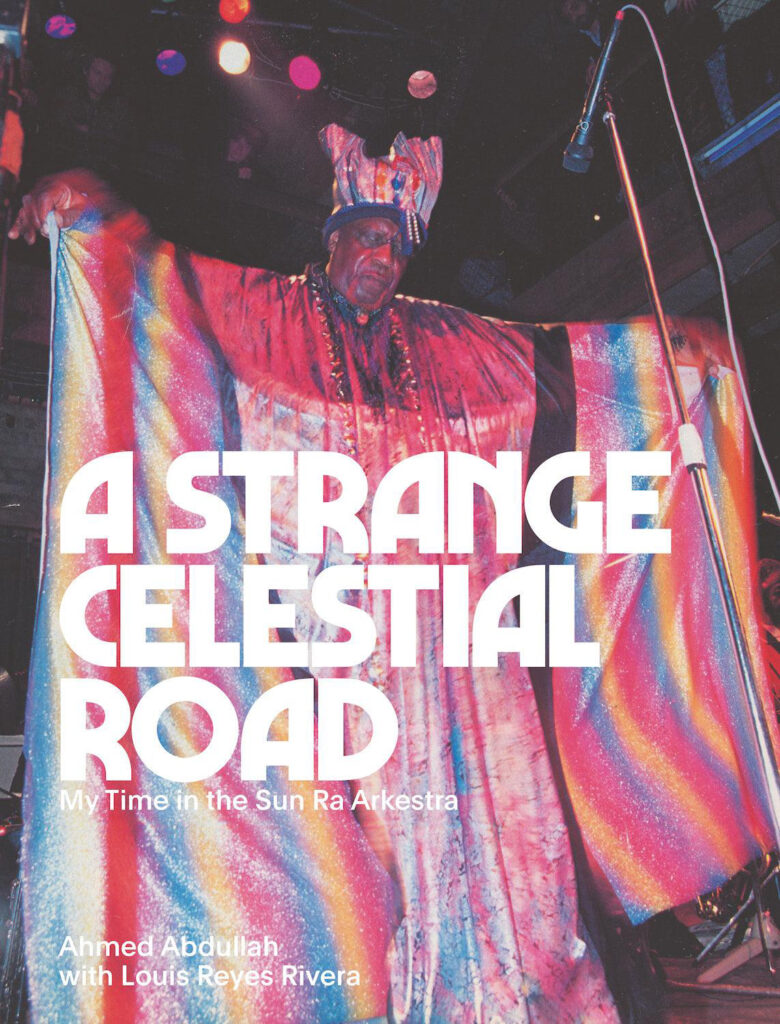The Journey of Ahmed Abdullah in the Sun Ra Arkestra
In this lengthy and captivating memoir, A Strange Celestial Road: My Time in the Sun Ra Arkestra (Blank Form Editions, 2023), the jazz trumpeter Ahmed Abdullah, in collaboration with the late poet, essayist, and professor of Africana Studies Louis Reyes Rivera, provides the reader with a description of his journey as a jazz trumpeter who came of age during the 1960s in the midst of the Black Arts and Black Power Movements and pays homage to Sun Ra. A Strange Celestial Road is thus both Ahmed Abdullah’s memoir and a body of lore for jazz virtuosos, musicians, writers, lovers of art and culture, and friends and supporters of Sun Ra. The words of Sun Ra, in the form of a maxim at the beginning of each chapter, symbolize a thread that connects all chapters and provides readers with a spiritual and philosophical lens by which to read Abdullah’s story and his time with the Sun Ra Arkestra.
As I read the book, I reflected on my memories of musicians, writers, and artists, who were motivated by the assassination of Malcolm X and the social and political climate that emerged after what some call the Second Reconstruction in American history, coalesced to form the Black Arts Movement. Abdullah engages readers by recounting stories of jazz icons and legends who include John Coltrane, Miles Davis, Dizzy Gillespie, Elvin Jones, Jackie McClean, Lee Morgan, Max Roach, McCoy Tyner, Pharoah Sanders, and Archie Shepp among others. Readers who remember these musicians and Sun Ra will reflect on their performances at venues such as Slugs, Birdland, The East, The Village Gate, The Bottom Line, the African Street Carnival, the Montreux Jazz Festival, the North Sea Jazz Festival, and FESTAC 77, the Second World Black and African Festival of Arts and Culture held in Lagos, Nigeria. The vivid photographs depicted in the book also help to bring these musicians and venues to life.
Central to this memoir is Abdullah’s emergence as a well-known musician, his embrace of the culture of the Sun Ra Arkestra, and his complicated relationship with Sun Ra. A natural storyteller who knows how to engage his readers, Abdullah provides courageous and brutally honest descriptions of his immersion into the culture of the Sun Ra Arkestra, interactions with musicians, embracing of Buddhism, personal challenges and tests, and relationships with women. The “personal is political” in this memoir, and Abdullah is especially transparent about his treatment of women and his subsequent appreciation of learning to view life from a feminist perspective. Readers are presented with a full portrait of the life of a Black man who has chosen to pursue his passion of music.
Musicians who were invited to play in the Arkestra Band became part of a collective with Sun Ra as a leader who advocated that he was playing music derived from the creator and informed by metaphysical, numerological, and African-centered values and worldviews. He expected all members of Arkestra to embrace his belief that “I’m dealing with the spirit and it is not measurable.” This belief laid the foundation for Sun Ra’ approach to creating his band and was embodied in all his actions and spelled out in the maxim at the beginning of Chapter I: The Call: “I be telling everybody, it’s not my band. It’s the Creator’s band, and if they’re not suitable for the future, they won’t be fit for the present.” He wore elaborate costumes, colorful and African-centered robes, a space helmet, and platform shoes, and he also required that Arkestra members wear similar costumes that were reminiscent of outer space and African traditions.
Like writers, visual artists, and other cultural performers, then and now, the Arkestra Band faced and overcame many hurdles. Abdullah provides examples of how they were subjected to exploitation by hotel, café, and cabaret owners; how it was a challenge to maintain ownership of their own music; and the ways in which the culture of drugs and alcohol in some cases shortened and damaged their personal health and musical careers.
A significant section of the book focuses on The Loft Movement, a movement represented by Black artists as “self-determination in the history of jazz.” During this Movement, musicians sought creative ways to bring music to the people. They bought loft spaces and formed studios housed by artists-in-residence.
In a social climate, where there are attempts to erase or distort the history of the Black experience, it is important to hear stories from the perspectives of those who have lived through these experiences. This is the contribution of Ahmed Abdullah and Louis Reyes Rivera. One may view A Strange Celestial Road as a reference book on Black jazz artists during the 60s and 70s, an insider’s story on the musician’s life, and a cathartic rendering of the journey of the artist.
Dr. Brenda M. Greene is a Professor of English and Founder and Executive Director of the Center for Black Literature at Medgar Evers College, CUNY.
